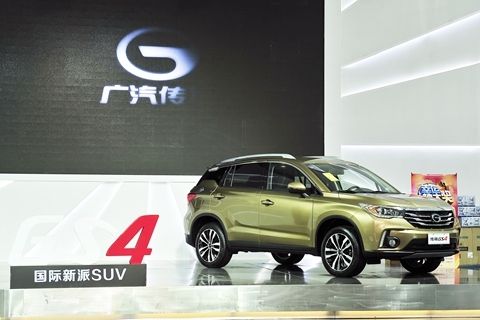Guangzhou Auto Puts U.S. Export Plans on Hold

Guangzhou Automobile Group Co. Ltd., a major carmaker whose joint venture partners include Honda and Toyota, is delaying plans to enter the U.S. because of uncertainties created by the U.S.-China trade war, according to a company document obtained by Caixin.
The delay marks the sector’s latest setback caused by the trade tensions and accompanying tit-for-tat tariffs. Last July the U.S. raised duties on imported Chinese cars to 27.5% from a previous 2.5%. China responded by raising its own tariffs on U.S. cars to 40% from a previous 25% but later suspended the increase as a goodwill gesture while the two sides try to negotiate a comprehensive trade agreement.
Guangzhou Auto had been laying the groundwork to export cars from its Trumpchi line to the U.S. but is now “reconsidering” the plan in light of the tariffs, group Chairman Zeng Qinghong said in the March 8 document obtained by Caixin. Zeng said the company is waiting for the situation to become clearer before proceeding.
China currently exports cars to a number of global markets, mostly developing countries in regions like the Middle East and Southeast Asia. In 2017 it exported just 53,000 vehicles to the hotly competitive U.S. market, the world’s second-largest after China.
Zeng said his company began laying the groundwork to enter the U.S. earlier this year. He said the company would enter when conditions were right and said Guangzhou Auto would not be simply exporting for the sake of exporting.
Guangzhou’s U.S. export plans are just the latest casualty of the U.S.-China trade war, which is being waged by U.S. President Donald Trump over the two countries’ large trade imbalance as well as practices Trump considers unfair such as strong state support for some Chinese industries. The U.S. was set to impose more punitive tariffs on Chinese imports at the start of this month, which would have triggered reciprocal tariffs from China. But it delayed that move as the two sides try to advance the settlement talks.
In May 2017, leading Chinese automaker SAIC Motor Corp. Ltd. said it was delaying plans to enter the U.S. because of uncertainties created by Trump. Similarly, in August last year Ford Motor Co. announced it was scrapping plans to export a China-produced Focus Active model to the U.S. Volvo also changed earlier plans to manufacture its XC60 model, which was slated for export to the U.S., from China to Sweden.
China-developed cars are still not mature enough for export to the U.S., said Cui Dongshu, secretary general of the China Passenger Car Association. “European car makers have also been punished in the U.S., and the standards and requirements of Chinese cars don’t conform to the U.S. market,” he said. He said local manufacturers should first build up their capabilities by exporting to developing markets such as the Middle East and Southeast Asia.
Contact reporter Yang Ge (geyang@caixin.com)

- 1China Officials Dismiss Tax Hike Rumors After Tech Selloff
- 2Cover Story: How Gutter Oil Became a Prized Fuel for International Airlines
- 3Prominent Chinese Journalist Liu Hu Detained by Police in Chengdu
- 4Maersk Unit Takes Over CK Hutchison Panama Ports After Court Ruling
- 5China Provinces Set Cautious 2026 Growth Targets
- 1Power To The People: Pintec Serves A Booming Consumer Class
- 2Largest hotel group in Europe accepts UnionPay
- 3UnionPay mobile QuickPass debuts in Hong Kong
- 4UnionPay International launches premium catering privilege U Dining Collection
- 5UnionPay International’s U Plan has covered over 1600 stores overseas





